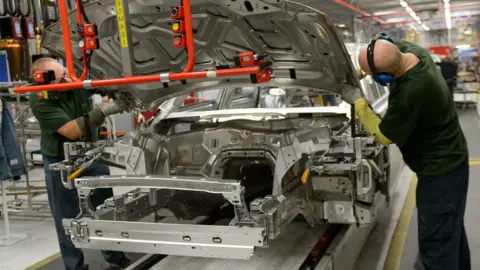Jaguar Land Rover owner Tata Motors feels chip shortage strain
 Jaguar Land Rover
Jaguar Land RoverJaguar Land Rover (JLR) owner Tata Motors says it is still feeling the strain of the global semiconductor shortage, but car sales are recovering after the pandemic.
JLR, which brings in most of the group's revenue, saw sales rise 68% year-on-year.
But Tata said the chip supply shortage was likely to worsen in the short term.
This meant that JLR production in the next quarter could be cut in half, it said.
Tata's losses for April to June narrowed to $598m (£432.7m), after a loss of more than $1bn in the previous three months.
Thierry Bolloré, JLR chief executive, said the environment continued to remain "challenging".
However, he added that the firm had seen year-on-year sales growth in all regions of the world, "demonstrating the appeal of Jaguar and Land Rover vehicles".
In April, JLR temporarily halted production at its two main factories in the UK because of the lack of chips.
Other big carmakers, including Toyota, Nissan, General Motors and Ford, have also been forced to cut production.
The coronavirus crisis has driven a shift to working, learning and socialising from home, which has boosted demand for laptops and other devices that use semiconductors.
That has added to the woes of the global motor industry, which was already reeling from the sharp downturn in sales caused by the pandemic and the challenges of switching to electric-powered vehicles.
In February, Jaguar Land Rover announced that its Jaguar brand would be all-electric by 2025 and that it will launch electric models of its entire line-up by 2030.
Carmakers are under pressure to meet stringent carbon emission demands in Europe and China, as well as customer demand for high-performance electric cars with a luxury or performance feel.
